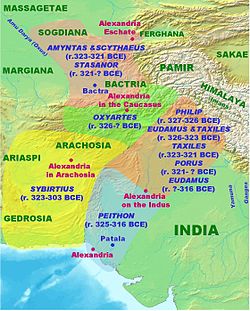Sibyrtius
Sibyrtius (Ancient Greek: Σιβύρτιος Sivyrtios; lived 4th century BC) was a Greek officer from Crete[1] in the service of Alexander the Great, who was the satrap of Arachosia and Gedrosia shortly after the death of Alexander until about 303 BC.Shortly after, Sibyrtius exchanged this post for the more important satrapy of Arachosia and Gedrosia, to which he succeeded on the death of Thoas (Θόας).[2] Following the death of Alexander in 323, Sibyrtius, in common with most of the other governors of the remote eastern provinces, retained possession of his satrapy, which was again confirmed to him in the second partition at Triparadisus in 321.His attachment was to Peucestas and not to Eumenes, and in Peucestas' subsequent intrigues against his commander-in-chief, Sibyrtius supported him so strongly that he incurred Eumenes' strong resentment, who threatened to bring him to trial; a fate from which he only escaped by a hasty flight.[4] Arrian mentions that Megasthenes, the historian and ambassador of Seleucus to the court of Chandragupta, lived with Sibyrtius, suggesting the latter may have remained at his post as satrap for quite a long time:[5][6][8] This article incorporates text from a publication now in the public domain: Smith, William, ed.

Ancient GreekAlexander the GreatArachosiaGedrosiaCarmaniasatrapyTriparadisusPeucestasPeithonSeleucusEumenesSusianaAntigonusArgyraspidsDiodorus SiculusArrianMegasthenesChandragupta MauryaPataliputraChandraguptaSandracottusAnabasis AlexandriCurtius RufusJustinPhotiusPolyaenusKosmin, Paul J.Smith, WilliamDictionary of Greek and Roman Biography and MythologyBostonpublic domainAlexander the Great'sGeneralsPhilip II's GeneralsAttalusParmenionAntipaterThe Somatophylakes(Alexander's bodyguards)AristonousArybbasBalacrusDemetriusLysimachusPtolemy (son of Seleucus)HephaestionLeonnatusPerdiccasPtolemySatrapsPartition of BabylonMacedonGreeceIllyriaThraceHellespontine PhrygiaPhrygiaAsanderNearchusPamphyliaMenanderPhilotas(3)CiliciaCappadociaPaphlagoniaLaomedon of MytileneNeoptolemusArmeniaBabyloniaMesopotamiaTlepolemusPersiaNicanor(2)ParthiaAntigenesArchonPhilipHyrcaniaStasanorDrangianaBactriaSogdianaPartition of TriparadisusArrhidaeusCassanderCleitus the WhitePhiloxenusStasanderCavalry GeneralsPhilotas(4)Cleitus the BlackErigyiusAretesAriston of PaioniaInfantry GeneralsMeleagerCraterusPolyperchonCoenusAlcetasAmyntasNicanor(1)Nicanor of StageiraHellenisticDemarchusGreater PhrygiaBalakrosAbistamenesAbdalonymusMithrenesMazaeusBabylonMazakesAbulitesOxydatesAtropatesPhrasaortesOxinesPersisCleomenes of NaucratisSatibarzanesAndragorasAmminapesPhrataphernesPharismanesArtabazosOxyartes